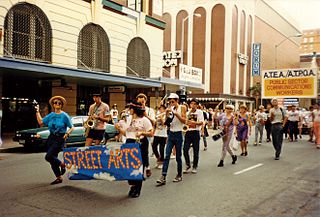Related Research Articles

David Keith Williason is an Australian playwright. He has also written screenplays and teleplays.
The Captain Matchbox Whoopee Band, also known as Soapbox Circus or Matchbox, were an Australian jug band formed in 1969. It centred on Mic Conway on lead vocals, washboard and ukulele; and his brother, Jim Conway, on harmonica, kazoo and vocals. They issued four studio albums, Smoke Dreams, Wangaratta Wahine, Australia and Slightly Troppo (1978), before they disbanded in September 1980. The Conway brothers reformed the group in 2010 as Captain Matchbox Reignited and disbanded again two years later.

La Mama Theatre is a not-for-profit theatre in Carlton, Victoria, Australia. It has been putting on contemporary theatre since 1967. La Mama produces work by theatre makers of all backgrounds.
Maxwell Irvine Gillies AM is an Australian actor and a founding member of the 1970s experimental theatre company, the Australian Performing Group.
Lindy Davies is an Australian actress, director, actor trainer and performance consultant. She played Ruth Ballinger in the Australian soap opera Prisoner in 1985, and won the AFI (AACTA) Award for Best Supporting Actress for the 1986 film Malcolm. She went on to be the head of drama at the Victorian College of the Arts for over 11 years until 2007, and worked as a performance consultant on films including Afterglow (1997) and Away From Her (2006) with Julie Christie.
Kim Gyngell, sometimes also credited as Kym Gyngell, is an Australian comedian and film, television and stage actor. Gyngell won the Australian Film Institute Award for Best Actor in a Supporting Role in 1988 for his role as Ian McKenzie in Boulevard of Broken Dreams.

Graeme Blundell is an Australian actor, director, producer, writer, playwright, lyricist and biographer.

Theatre of Australia refers to the history of the live performing arts in Australia: performed, written or produced by Australians.
John Henry Romeril is an Australian playwright and teacher. He has written around 60 plays for theatre, film, radio, and television, and is known for his 1975 play The Floating World.
Barry Dickins is a prolific Australian playwright, author, artist, actor, educator and journalist, probably best known for his historical dramas and his reminiscences about growing up and living in working class Melbourne. His most well-known work is the award-winning stage play Remember Ronald Ryan, a dramatization of the life and death of Ronald Ryan, the last man executed in Australia. He has also written dramas and comedies about other controversial figures such as poet Sylvia Plath, opera singer Joan Sutherland, criminal Squizzy Taylor, actor Frank Thring, playwright Oscar Wilde and artist Brett Whiteley.
John Charles Hibberd is an Australian playwright and physician.
Dimboola is a play by the Australian author Jack Hibberd. It premiered in 1969 at La Mama Theatre under the direction of Graeme Blundell. The whole action of the play supposedly takes place at a real wedding at which the actors represent the families of the bride and groom and the audience are "invited guests". The play is described in the program notes as Rabelaisian and rumbustious.
Jan Cornall is an Australian singer, comedian and writer. Known for her contributions to queer music through the group Baba Yaga during the 1970s and the hit musical Failing in Love Again (1979), Jan Cornall was a leader in the women's comedy and cabaret resurgence of the early 1980s. She has contributed to Australian community theatre, addressing issues facing regional and rural women, and had a long involvement in forging cross cultural links with Indonesian and Australian writers and artists.

Street Arts Community Theatre Company was a theatre company in Brisbane, Queensland, Australia. It was founded in October 1982 in West End, Brisbane, by Denis Peel, Pauline Peel, Steve Capelin and Andrea Lynch. Street Arts was preceded in Brisbane by the agitprop ensemble the Popular Theatre Troupe. While continuing in the Popular Theatre Troupe's tradition of satire and radical political commentary, the Street Arts approach was to create theatre and circus by enabling disadvantaged communities. This became the dominant community arts methodology in Queensland in the mid-1980s, attracting funding from Australian arts boards including the Community Arts Board and Performing Arts Board. In 1997 it changed its focus to interdisciplinary public art and renamed itself The Arterial Group Inc. Arterial produced a substantial number of projects with urban and regional Queensland communities from 1996 to 2004.

Mic Conway is an Australian vocalist and with his brother, Jim Conway, was a co-founder of the 1970s humour, theatre and rock group, The Captain Matchbox Whoopee Band.
The Pram Factory was an Australian alternative theatre venue in the Melbourne suburb of Carlton from around 1970 until 1981. It was home to the Australian Performing Group and Nindethana, Australia's first Aboriginal theatre group.
Dalmas is a 1973 Australian film directed by Bert Deling. One critic wrote that "with Dave Jones’ Yackety Yack [the film] constitutes the clearest presence of Godard in Australian cinema."
John Timlin is a theatre producer, literary agent and was the administrator of the Australian Performing Group in Melbourne.
The New Theatre in Melbourne, formerly Melbourne Workers' Theatre Group, was one of a number of branches of Australia's New Theatre movement established in the 1930s. This was a radical left theatrical movement which staged performances with a political message. The theatre group existed from 1936 until 2000.
Australian Nouveau Theatre, also known as the Anthill Theatre, was a Melbourne-based theatre company under the direction of Jean-Pierre Mignon. Operating from 1980 to 1994, it concentred on classic European drama, often in experimental productions.
References
- ↑ Wolf, Gabrielle (2008). Make it Australian: The Australian Performing Group, the Pram Factory and New Wave Theatre. Currency Press. ISBN 978-0-86819-816-3.
- ↑ "Introducing the Australian Performing Group of the 70s", 16 July 2013, thekeenans.id.au